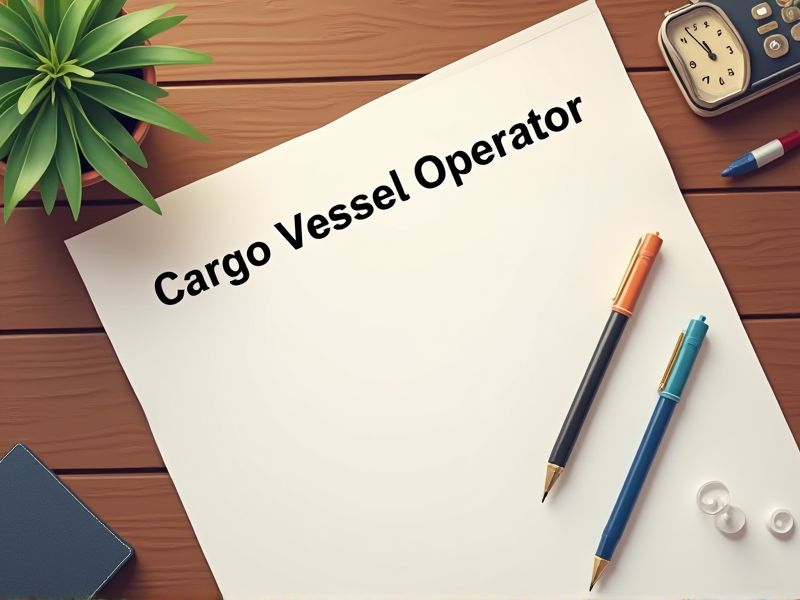
Cargo vessel operators require specific certifications to navigate complex international regulations and ensure safety at sea. These certifications verify the operator's expertise in handling large vessels and managing cargo effectively. The certifications assure compliance with maritime laws and environmental standards. Here are some critical certifications needed for a cargo vessel operator.
STCW Basic Safety Training Certificate
The STCW Basic Safety Training Certificate ensures cargo vessel operators have the essential skills to manage emergencies at sea, reducing the risk of accidents. Compliance with international regulations through this certification elevates the safety standards aboard the vessel, protecting both crew and cargo. Holding the certificate demonstrates an operator's commitment to professional competence and global maritime requirements. Insurance and regulatory bodies often require this certification, influencing the vessel's operability and financial health.
STCW Advanced Firefighting Certificate
The STCW Advanced Firefighting Certificate is required for cargo vessel operators to ensure they possess the skills to manage and control onboard fires effectively. Without this certification, operators may lack the necessary knowledge to execute fire prevention, detection, and suppression techniques, leading to increased risks of catastrophic incidents. The certificate provides operators with the ability to identify fire hazards and coordinate firefighting teams during emergencies, enhancing overall vessel safety. International regulations mandate this certification to maintain consistent safety standards and protect both crew and cargo across global maritime operations.
STCW Medical First Aid Certificate
The STCW Medical First Aid Certificate is needed for cargo vessel operators to ensure they are equipped to handle medical emergencies on board where access to immediate professional medical care is limited. Compliance with international maritime safety regulations mandates such certification to enhance the overall safety and wellbeing of the crew. The certificate equips operators with essential skills to administer first aid effectively, reducing the severity of potential injuries or illnesses. It also helps operators identify and manage medical risks, promoting a safer working environment at sea.
Proficiency in Survival Craft and Rescue Boats Certificate
Proficiency in Survival Craft and Rescue Boats Certificate ensures cargo vessel operators are trained to handle emergency situations, reducing the likelihood of accidents at sea. This certification equips operators with the skills to efficiently launch and maneuver survival craft, critical during evacuations. Proper training in rescue operations enhances crew safety, fostering a safer working environment on board. Regulatory bodies mandate this certification to comply with international maritime safety standards, ensuring all operators are adequately prepared.
International Ship Security (ISSC) Certificate
The International Ship Security Certificate (ISSC) ensures compliance with the International Ship and Port Facility Security (ISPS) Code, which bolsters the security framework of cargo vessels. The certification validates that a cargo vessel operator has implemented a ship security plan, reducing risks of piracy and terrorism. By holding an ISSC, operators meet international regulations, enabling smoother port entry worldwide. This certificate helps safeguard crew, cargo, and infrastructure, enhancing global maritime trade security.
Cargo Handling and Stowage Planning Certification
Cargo Handling and Stowage Planning Certification is essential for cargo vessel operators to ensure safe and efficient loading, stowage, and unloading operations, minimizing the risk of accidents. Proper certification provides operators with updated knowledge on international maritime regulations and best practices, crucial for compliance. Trained operators can reduce cargo damage and loss, contributing to cost savings and maintaining client trust. Certification enhances operational efficiency, leading to improved scheduling and turnaround times, directly impacting profitability.
Maritime English Proficiency Certificate
The Maritime English Proficiency Certificate ensures that cargo vessel operators can effectively communicate in international waters, where English is the universal language. Miscommunication can lead to costly accidents, delays, or safety hazards, making language proficiency critical. Global regulations and standards require operators to have this certification to minimize risks and enhance operational efficiency. Having the certificate demonstrates compliance with International Maritime Organization (IMO) guidelines, which facilitates safer and more reliable shipping practices.
Bridge Resource Management (BRM) Certification
Bridge Resource Management (BRM) Certification ensures cargo vessel operators are equipped with essential skills in team coordination and decision-making. Effective resource management on the bridge reduces human error, which is a leading cause of maritime accidents. Crew members with BRM training communicate more efficiently, promoting safer navigation and cargo handling. International regulations and shipping companies often mandate BRM Certification to ensure compliance with safety standards.
Electronic Navigation Systems Certification
Electronic Navigation Systems Certification is essential for cargo vessel operators because it ensures they are proficient in the use of modern navigation technology, reducing the risk of maritime accidents. Certification fosters compliance with international maritime regulations, which are crucial for maintaining safety and efficiency in global shipping lanes. It equips operators with the skills to interpret and utilize data from electronic charts and automated systems, enhancing decision-making in complex nautical environments. Certification verification often becomes a mandatory requirement by shipping companies or insurance providers to mitigate liability and uphold safety standards.
Global Maritime Distress and Safety System (GMDSS) Certification
GMDSS Certification ensures cargo vessel operators are equipped to handle international communication standards essential for maritime safety. This certification mitigates risks by ensuring operators can effectively use equipment for distress signaling, enhancing response times in emergencies. Compliance with GMDSS regulations is mandated by international maritime laws, making certification necessary for legal operation. Reliable communication facilitated by GMDSS certification contributes to both crew safety and environmental protection through prompt and accurate distress alerts.
Summary
You enhance your credibility and trustworthiness in the industry by obtaining certifications as a Cargo Vessel Operator. This increased trust often results in more business opportunities, leading to higher revenues. You can expect operational efficiencies to improve through adherence to industry standards. Enhanced safety measures and compliance with regulations also reduce the risk of legal liabilities.
